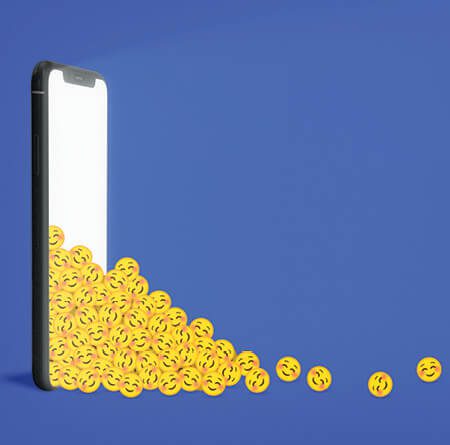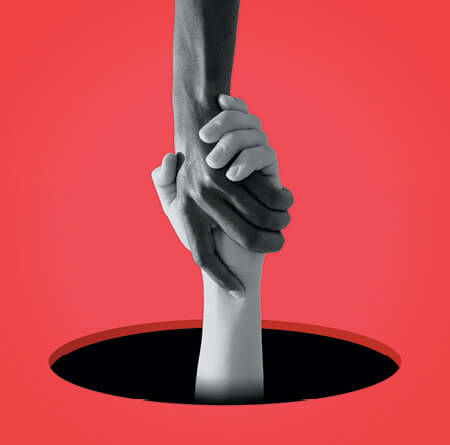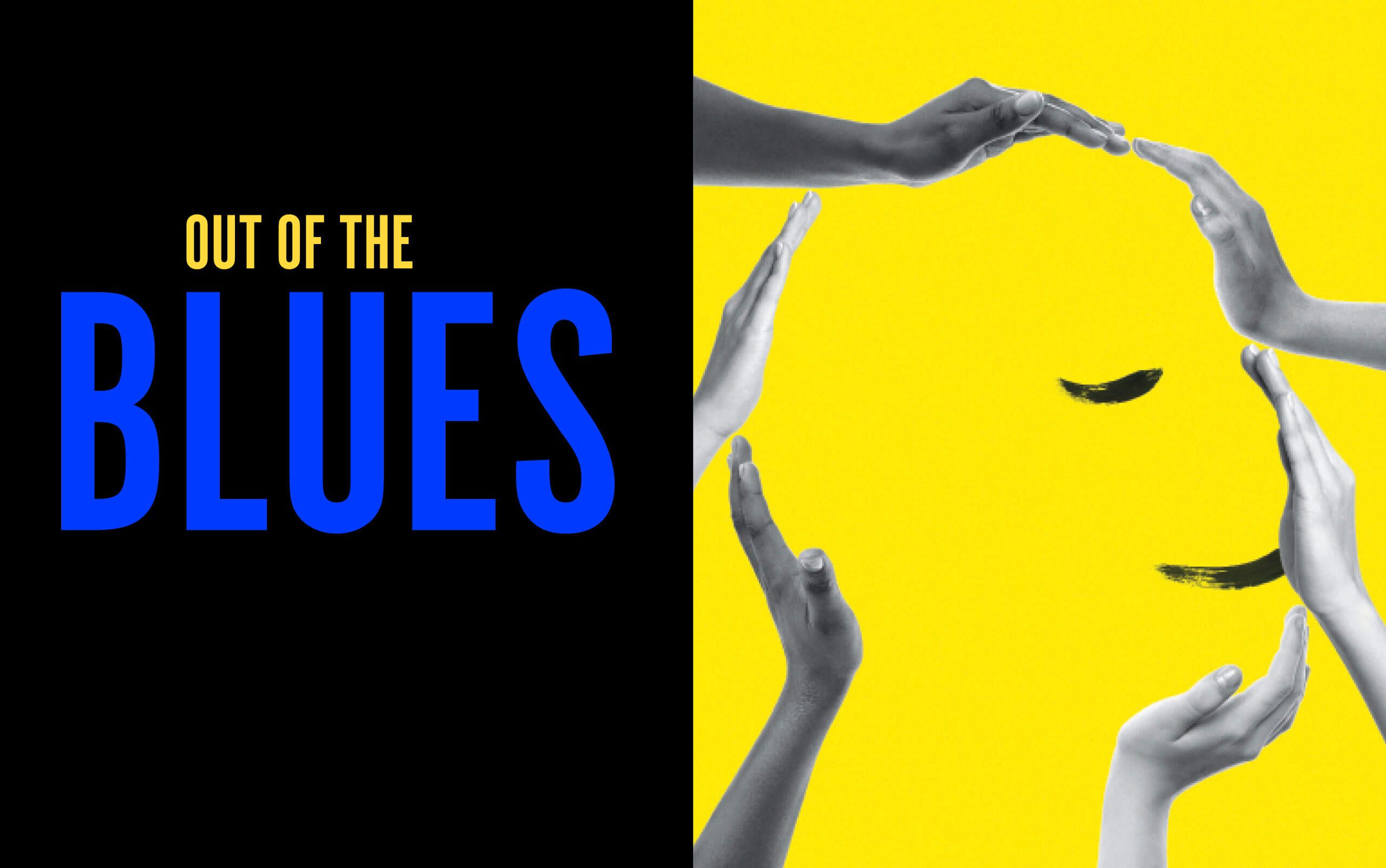Haas alumni work to destigmatize mental illness and improve well-being.
In the fall of 2020, deep into the pandemic, Newton Cheng, MBA 08, was working harder than ever. By early 2021, he knew something was wrong. He was spent, exhausted, unable to feel happiness or joy. One morning upon waking he was filled with so much dread that he couldn’t get out of bed.
As the director of health and performance at Google, Cheng oversees programs that promote well-being in Google’s global workforce. But despite his job description and an appreciation of the importance of physical and mental health, he wasn’t immune to his own mental health challenges. So in January 2022, he opted to take a three-month leave to address his depression and anxiety. “My therapist called it ‘overwork syndrome,’” Cheng says. It was affecting all aspects of his life, including his most important relationships. “I was ashamed of the way I was showing up as a husband and father.”
Time away gave him the space to recalibrate, yet he knew his situation was hardly unique. According to Microsoft, over 50% of us globally are burned out at work. Another survey by McKinsey says that 59% of the global workforce reports having at least one mental health challenge.
After returning from leave, Cheng decided to publicly share his story. Doing so didn’t come naturally to him, but he put aside his discomfort and posted about his experience on social media. He got positive responses on Facebook and Instagram, but by far the largest response was within his professional network on LinkedIn. “The post received roughly 2,000% more engagement than my previous posts,” he says.
Indeed, if the COVID-19 pandemic has any silver lining, it may be the way it’s revealed some of society’s long-simmering ills, one of which is the state of our mental health. Long a taboo subject in general—and in the workplace in particular—the trauma and disruption of the pandemic brought mental health out of the shadows and positioned it front and center.
Fortunately, members of the Haas community have long recognized problems in the way we talk about mental health and in the systems we use to provide care. And they’ve put their energy into trying to solve them.
Changing the culture
Ian Shea, BCEMBA 07, learned firsthand how important it is to tend to one’s own mental health when a company he started didn’t pan out. The experience was emotionally taxing, and he was dogged by fear, anxiety, and doubt. “To get through that, just for my own personal survival, I really had to develop my own emotional and spiritual practice,” he says. But like Cheng, Shea knew his experience wasn’t unique and that others had gone through similar trials—or would at some point. He realized that creating space at work for more emotional support and open dialogue would be a good thing for people and for businesses. But they needed guidance.
So Shea created I M Human to provide that guidance to companies that have decided to make well-being a strategic priority. This is more than simply implementing a program, he says. “It’s a practice. Culture is at the heart of it. It’s how leaders treat their employees, how they give feedback, and how they create space for self-care.” The goal is broad culture change within companies, so well-being becomes a core part of their values.
Shea’s company was brought in by global law firm O’Melveny & Myers after the American Bar Association reported high rates of depression, anxiety, and loneliness in the legal profession and created the ABA Well-being Pledge. The firm, says Shea, has since been awarded the #1 well-being program in the legal industry, in part because of its work with I M Human.
A challenge to find new ideas
 According to Gallop’s 2022 State of the Global Work Force, a mere 21% of employees said they were engaged at work, and just 33% said they were thriving in their overall well-being. While no field has a monopoly on unhappiness, Michael Martin, MBA 09, discovered that construction workers have one of the highest suicide rates across all industries. Martin works in energy, infrastructure, and sustainability at Google, and he regularly visits construction sites, so the issue was more than academic.
According to Gallop’s 2022 State of the Global Work Force, a mere 21% of employees said they were engaged at work, and just 33% said they were thriving in their overall well-being. While no field has a monopoly on unhappiness, Michael Martin, MBA 09, discovered that construction workers have one of the highest suicide rates across all industries. Martin works in energy, infrastructure, and sustainability at Google, and he regularly visits construction sites, so the issue was more than academic.
He shared what he’d learned with senior leaders at Google. “Clearly,” says Martin, “if we’re dealing with these issues on site, this was going to result in project delays and money lost. But beyond that, there’s a moral imperative to make the sites a better place to work.”
By way of a solution, in 2020 Martin founded the John E. Martin Mental Healthcare Challenge at Haas, seeded with his own money and sponsored by Google. The annual case competition aims to develop solutions to improve the quality of mental healthcare and access. In its inaugural year, 12 teams from top MBA programs proposed ways to use data to better support construction workers facing anxiety, addiction, depression, and suicide. The winning solution—from a Berkeley Haas team—featured an AI-powered app that addressed prevention, assessment, and intervention.
Martin had already made a commitment to improving mental health via his Berkeley connections. In 2015 he founded the John E. Martin Fellowship in honor of his father, a Vietnam veteran who overcame his own mental health struggles and became a counselor to fellow vets. The Martin Fellowship provides financial support to students at Haas, the School of Public Health, and/or the School of Social Welfare. The Healthcare Challenge further elevates the importance of addressing mental health for all members of society.
Julia Cohen, MBA/MPH 24, was a member of the prize-winning team at the 2022 Mental Healthcare Challenge, when the focus was adolescent health. Cohen and her teammates developed an intervention designed for rural transgender youth called Y’ALL. Says Cohen, “Y’ALL seeks to build community and foster resilience through both digital technology and a rotating in-person neighborhood pop-up event.”
According to Microsoft, over 50% of us globally are burned out at work. Another survey by McKinsey says that 59% of the global workforce reports having at least one mental health challenge.
Cohen’s team focused on transgender rural adolescents because the unmet need in that population is so great. “Rural trans youth have higher mental health incidents. Suicidal ideations are higher, and access to mental health resources is limited,” Cohen says. Y’ALL’s emphasis is on building community, with a focus on preventing mental health issues rather than waiting until serious problems take root.
 Reaching young people
Reaching young people
Transgender rural youth face unique challenges, but the incidence of anxiety and depression among all young people has been on the rise. Rates were increasing well before the pandemic, but COVID’s disruptions and enforced isolation only made things worse.
Addressing mental health issues as early as possible is key, says Anjali Menon, BS 11. “The majority of mental illness begins by age 24 or before. So you really have to start early,” she says. In 2021, Menon co-founded tbh, a resource that partners with schools—both K-12 and higher ed—to supplement the mental health services available to students. Menon was motivated to start tbh when she saw the inadequate options available to a college-age friend who was struggling with mental health issues.
“I’m trying to model a different way of leading. I’m showing up more vulnerably, and I’m creating space for others to share their stories.”
—Newton Cheng, MBA 08
Her company facilitates online skills-based, therapist-led groups that help students build a social-emotional toolkit. As with Cohen’s project Y’ALL, the emphasis is on prevention, giving young people the skills to tend to their own well-being. Menon says the groups allow students to connect with mental health experts in a way that feels friendly. And she says students really appreciate the group format. “It helps them see their problems reflected in other people, and they feel less alone,” she says.
Stigma and other barriers
Attitudes concerning mental health issues are gradually changing, but stigma persists and often serves as a barrier to seeking care. This is particularly true in communities of color, says Karan Singh, BS 05. “My family’s originally from India, and this is definitely not a topic you talk about in many brown communities,” he says. “It wasn’t in our house.” Looking back, Singh suspects this is why he was blindsided when a family member tried to take their own life some years ago. “None of us knew this person was struggling,” he says.
Yet even in the absence of stigma, problems of access remain. “Most people trying to see a provider wait weeks if not months,” says Singh. And once you find someone, the quality of care varies dramatically. And then there’s the issue of cost. Many providers are out of network, so payment is out of pocket, putting help out of reach for many. To address some of these problems, in 2011 Singh and his partners founded Ginger, one of the first online clinics to provide on-demand mental healthcare.
In 2021, Ginger merged with Headspace, the popular mindfulness meditation app, to become Headspace Health. Singh says that adding mindfulness to Ginger’s other clinical services has allowed them to provide a full care continuum and now touches the lives of more than 100 million people in 190 countries. Their solutions Headspace for Work and Ginger are distributed through more than 4,000 enterprises, including Starbucks, Adobe, and Mattel, and through health plans such as Cigna—a true sign that mental health treatment has moved from the back room to the boardroom.
Like Singh, when Brad Kittredge, MBA/MPH 09, looked at the mental healthcare landscape, he saw lots of problems. One of the major issues he’d identified in healthcare delivery was routinization. “Our healthcare system has been treating depression or anxiety as one thing when in fact they’re complex, heterogeneous conditions,” he says. “And the reality is that the traditional care model hasn’t gotten good outcomes that way.”
In 2017, Kittredge co-founded Brightside Health, which provides evidence-based and personalized online therapy and medication management from licensed practitioners. One of Brightside’s innovations is using data to understand each person’s unique presentation then analyzing that data to make targeted prescribing suggestions to doctors. Kittredge says they’re getting measurably better outcomes. One study comparing Brightside’s approach to treatment as usual found that close to 80% of Brightside patients experienced a reduction of five or more points on a depression assessment, compared to 52% of patients treated as usual.
Last December, in response to rising suicide rates, Brightside launched a first-of-its-kind telehealth program to treat people at an elevated risk for suicide. The program is rolling out nationally, and Kittredge says they’ve begun collaborating with health systems and health insurance companies on suicide risk-reduction programs.
The public good
While some in the Haas community are creating new ways to deliver mental healthcare, Alyssa Zachariah, MBA 22, is helping to implement existing public health services for thousands of San Franciscans. Zachariah works for San Francisco’s Department of Public Health and manages the budget for the Mental Health Services Act.
The MHSA, passed in 2004, levies a 1% tax on incomes over $1 million and distributes those funds to counties for mental health services—which cover everything from prevention to treating serious illness. The $50 million fund currently supports 87 programs in San Francisco. But because funds are tied to income tax, there’s a lot of volatility, which makes Zachariah’s job complex.
Initially Zachariah wanted to be a mental healthcare provider, but she found she was more interested in the systems that help deliver services. “I felt like I was contributing toward a larger system that was doing incredibly important work for a population that other institutions aren’t necessarily motivated to serve,” she says.
Developing better ways to provide mental healthcare and enabling people to tend to their own well-being are enormous challenges. But solutions are out there—many devised by Haas alumni. Admittedly, some are easier to institute. Google’s Cheng, for example, is continuing to use his experience with depression and anxiety to help spark change. “I’m trying to model a different way of leading. I’m showing up more vulnerably, and I’m creating space for others to share their stories,” he says.
But Cheng and others agree that more is needed. “Change isn’t going to happen unless we change the systems around us,” Cheng says. And that includes not only our systems at work but the way we treat mental health more broadly. Cheng sees this as a challenge for the Haas community, for whom doing good is woven into the culture. “What do we want to do as a community to address this?” he asks.
